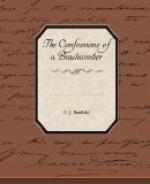Here let me advise readers to call to memory Nathaniel Parker Willis’s poem, “The Declaration” beginning—
’Twas late, and the gay company was gone,
And light lay soft on the deserted room,
and ending:
She had been asleep.
The crocodile moved not as we, thirsting for its blood, stealthily approached. Then as I raised the rifle “Paddy” tilted up his much-flattened nose, sniffed, and in tragic whisper said—“Dead!”
At all times a crocodile has a characteristic odour, a combination of fish and very sour and stale musk, but Paddy smelt more than the familiar scent—the scent of carrion.
Most unworthy of mortals, we had found the rarest of unprecious things—a crocodile that had died a natural death. Apparently a day, or at the most a day and a half, had elapsed since the creature had laid its head under the shadow of the boulder and died, far from accustomed haunts and kin. There was no sign of wound, bruise or putrefying sore. All the teeth were perfect. It seemed like a crocodile taking its rest, with its awful stench around it.
With poles we levered the body out of the way of the tide. Months after, when Nature had done her part in the removal of all fleshy taint, we returned for the bones. The teeth are now scattered far and wide as trophies of the one and only crocodile ever acknowledged to have been discovered dead.
To account for such a phenomenal occurrence a theory should be forthcoming. This ill-fated crocodile is assumed to have wandered from its proper quarters—the Tully or the Hull River, or one of the unnamed mangrove creeks of the mainland. Having lost its way, it emerged from the sea at pretty Panjoo. So different was the locality from that to which the poor forlorn creature had been accustomed, it was at once seized with a fatal attack of home-sickness. Shedding a few tears natural—to it ("’Tis so, and the tears of it are wet"), it died ("and the elements once out of it, it transmigrates"). Such is the theory, annotated by Mark Antony’s immortal after-dinner gossip, on the emotions and natural history of the species.
THE ARABS PRECEPT
“A Pearl of Great Price”
“Mister, I tell you, neber say anything. I hab bin reech once. I lorse my reechness for that I talk a little bit; but I talk too much. I poor man now. I lorse my chants. Suppose I no lorse my chants I am reech man of my country.”
So said Hassan, the Arab with the pearly teeth, as he sat on the edge of the verandah one steaming January evening.
“Yes, Hassan. How did you lose your money?”
“I hab no money, Mister. But I hab a pearl. My word, Mister, I tell you my yarn about that pearl. My beauty beeg pearl. White pearl—more white than snow-white! my pearl!”
The thin-framed swarthy Arab, with the flashing eyes and glistening teeth, quivered with the intensity of his recollection.




